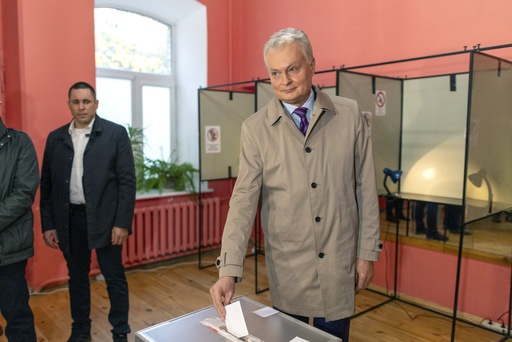
VILNIUS, Lithuania — In a significant political shift, Lithuania’s center-left opposition parties celebrated their triumph on Monday after successfully defeating the incumbent center-right coalition in the final round of national elections.
All votes have been tallied from Sunday’s polls, revealing that the Social Democrats secured 52 seats in the parliament, officially known as the Seimas, out of a total of 141. This marks the end of the four-year governance by the conservative Homeland Union, previously led by Prime Minister Ingrida Šimonyt?.
The Social Democrats are set to initiate discussions for the formation of a majority government with the support of two smaller center-left parties: the Democratic Union, which won 14 seats, and the Union of Peasants and Greens, obtaining 8 seats. Collectively, this coalition will have a minimum of 74 seats in the parliament.
In contrast, Šimonyt?’s Homeland Union faced a decline, securing only 28 seats in the two-round election process.
In the wake of the victory, Vilija Blinkevi?i?t?, the leader of the Social Democrats, expressed her gratitude to supporters in a bustling downtown Vilnius celebration on Sunday. “I am very thankful to the citizens of Lithuania for their active participation in voting for us,” she remarked, noting that “the results indicate a desire for change, a completely different government.”
The defeat surprised many among the ruling conservative party, especially since they were just two seats behind the Social Democrats during the first round of voting. Analysts had forecasted that voters in Lithuania typically favor change after every four-year cycle.
Acknowledging the electoral pattern, Šimonyt? conceded, stating, “In Lithuania, it’s common to see this swinging back and forth during elections. We respect the voters’ choice.”
The elections are particularly noteworthy given the geopolitical context, as Lithuania borders the Russian exclave of Kaliningrad to the west and Belarus to the east. This political shift comes during a period of heightened tensions due to Russia’s ongoing war in Ukraine, which has intensified concerns regarding Moscow’s ambitions in the vital Baltic region.
Despite the electoral outcome, analysts predict that there will likely be no significant changes in Lithuania’s foreign policy. As a member of both NATO and the European Union, Lithuania remains a firm supporter of Ukraine.
The outgoing government faced backlash for the stringent policies implemented during the pandemic, with critics arguing that the administration failed to adequately support businesses during lockdowns and that many individuals lacked proper access to healthcare services.
Šimonyt? was also criticized for her management of migrants arriving from Belarus, with claims that both Belarus and Russia were orchestrating the increase of individuals, primarily from Africa and the Middle East.
Although Lithuania has experienced robust personal income growth in recent years and boasts one of the lowest inflation rates within the European Union, many voters appeared unphased by these statistics.
Furthermore, the recent election results suggest that the new cabinet can be assembled without the populist Nemuno Aušra party, which finished third with 20 seats. Notably, its leader, Remigijus Žemaitaitis, had resigned from parliament earlier this year due to antisemitic remarks.
Following the election results, Gabrielius Landsbergis, Lithuania’s foreign minister, announced his resignation from leadership within the Homeland Union and stated his intention to exit politics altogether.
Voter turnout on Sunday was reported at 41.31 percent, marking it as one of the highest rates for a runoff election in recent memory.
